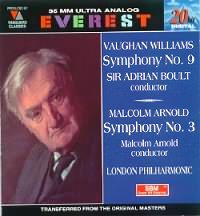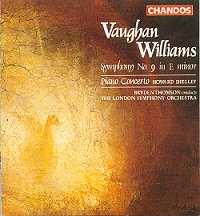Recordings Under Consideration:-
-
Boult/London PO, Everest 9001
-
Boult, London PO, EMI
CDM7
64021-2
-
Previn, London SO, RCA GD 90508
-
Thomson, London SO, Chandos 8941
-
Slatkin, Philharmonia, RCA 09026-61196-2
-
Handley, Royal Liverpool PO, EMI Eminence 7243 5 65455 2 6
-
Andrew Davis, BBC SO, Teldec
4509984632
-
De Freitas Branco/National SO Portugal, Portugalsom SP 4084
-
Bakels, Bournemouth SO, Naxos
8.550738
Vaughan Williams remained an extraordinarily creative artist up until his
death at the age of 86. The last three symphonies, Hodie, the
Concerto for Tuba and Romance for Harmonica, The Sons of Light,
An Oxford Elegy and Epithalamion are all products from VW's final
decade and they share a vibrant youthfulness and icy brilliance that is
characteristic of his later music. This was a period when he was experimenting
with colour, sonority and form as is particularly evident in his last three
symphonies. Clearly his mind was as active as ever therefore it must have
been frustrating for him that his later works were greeted with muted enthusiasm.
Vaughan Williams was still the 'Grand Old Man' of British music but his critical
reputation was at a low point and he was increasingly seen as an archaism
whose style was insular and backward-looking.
Forty years later VW's reputation as one of the great 20th Century composers
is secure. Many of his earlier works are performed regularly such as the
Tallis Fantasia, On Wenlock Edge, The Lark Ascending and A London
Symphony while his 5th Symphony is gaining ground as his most popular
symphony. Have his later works found a place in the repertory? With a few
exceptions, the answer is 'no'. The wonderfully atmospheric Sinfonia Antartica
gets an occasional hearing and has proved very popular on record but
the riotous 8th Symphony is still under-played. Hodie would seem a
natural to become a Christmas favourite but performances are rare. Pilgrim's
Progress is thankfully being reappraised due to several first-rate recordings
but it still awaits a definitive fully-professional staging.
Of all VW's late works, none remains more underrated or misunderstood than
his final symphony, the Ninth. Sir Malcolm Sargent gave the premiere on April
2, 1958 and by most accounts, the performance was disappointing. Several
critics wrote the work off as "silly" and "asinine" according to Michael
Kennedy's study on the composer while Sir Adrian Boult himself said he believed
the 9th represented a "falling off" for the composer. Not all musicologists
have agreed with those assessments, however. Peter J. Pirie regarded the
9th as one of VW's very greatest works saying the music struck him as something
that might have been prompted by a nightmare the composer may have had. VW
himself said the original inspiration for the 9th came from Salisbury and
its associations with Thomas Hardy's Tess. Whatever its inspiration, the
9th Symphony is an imposing work but one that has been well served on record.
With only a couple of exceptions, every recording of the 9th has been part
of a recorded cycle of VW symphonies. Evidently recording companies have
not found the work important enough to record on its own.

Sir Adrian Boult made the premiere recording for Everest on August 26, 1958.
That date is significant as it was the day of VW's death and on the current
CD release from Everest, Boult's taped tribute to VW is heard before the
music begins. Boult had recorded the previous eight symphonies for Decca
and its surprising that it was an American label that recorded the 9th Symphony
especially when Decca needed the recording to complete its cycle. Perhaps
Decca's reluctance to record the symphony is another indication of the work's
poor standing at that time. It was Decca's loss for Boult gives a harrowing
performance, one of the best on record, in absolutely first-rate sound. In
fact, this 40-year old recording, re-mastered using 20-bit technology, sounds
warmer and more open than several of its digital successors. What is most
remarkable about this performance is the dedication of the playing by the
London Philharmonic. The players sound as if they were all deeply affected
by VW's immediate passing for there is an intensity and commitment to the
playing that no other recording matches, least of all Boult's EMI remake
from the early 1970s, again using the London Philharmonic. The Everest is
coupled with a wonderful performance of Malcolm Arnold's 3rd Symphony with
the composer conducting.
André Previn's RCA recording with the London Symphony is much
more polished than either of the Boult recordings. In fact, the whole performance
is just a little too polished. Previn smoothes away the score's craggier
edges and thereby diminishes its brutal power. There is a wonderfully foreboding
atmosphere to much of his performance but I prefer something more extrovert.

My favourite recording of the work may be the rawest version of all. Bryden
Thomson's 1980s set of VW symphonies for Chandos was extremely uneven. He
fared well with an impassioned 5th Symphony and an unusually dark London
Symphony but most of the others from his cycle sound disengaged. It is
especially surprising, considering his lacklustre accounts of both the 4th
and 6th, that Thomson would produce the most brutal account of the 9th on
record. No other performance relates the 9th so closely to VW's other E-minor
symphony, the 6th. Thomson adopts a more urgent tempo for the first movement,
shaving nearly two minutes off the Boult and Previn accounts. The whole character
of the movement changes as a result. Rather than sounding foreboding, the
music becomes violently frenzied. The London Symphony plays brilliantly for
Thomson who makes no attempt to soften their sound. The flugelhorn solo in
the second movement and the several sections for the saxophone trio are all
beautifully played. Some conductors have brought out more of the symphony's
sardonic humour but Thomson plays the work absolutely straight. No light
or levity is allowed to intrude on what under his directions becomes a very
tragic piece. The symphony comes coupled with VW's magnificent Piano Concerto
in its original form with Howard Shelley as the soloist. The recorded sound
is good but suffers from the overly reverberant acoustic that marred many
of Chandos' recordings from this period.
RCA provides demonstration quality sound for Leonard Slatkin in his recording
with the Philharmonia. The combination of a gloriously full sounding orchestra
in very rich sound is overwhelmingly impressive. Slatkin's interpretation
is one of the best from his cycle of VW symphonies with tempos that are virtually
identical to those of Boult. There is nothing to fault in this performance
although I miss some of the biting urgency of Thomson's recording. Slatkin's
9th is coupled with an equally impressive 8th Symphony.
Perhaps the safest recommendation for a recording of the 9th is Vernon Handley's
on EMI Eminence. His Royal Liverpool Philharmonic Orchestra is leaner and
meaner than Slatkin's Philharmonia much to the work's advantage. Tempos are
again very close to those of Boult and yet there is a greater sense of urgency
and Handley illuminates more orchestral details giving his performance a
more colourful sheen. He may also be the most successful in holding the sprawling
shape together particularly in the final movement where textures thicken
considerably. While Handley's view of the work may not be as personal as
Thomson's, it is probably more faithful to Vaughan Williams' intentions.
His version is coupled with an excellent performance of the 6th Symphony
and the recorded sound is open, clean but a little strident in louder passages.
One of the more unusual recordings of the 9th to be issued is the version
just released by Portugalsom featuring the National Symphony Orchestra (of
Portugal) conducted by Pedro De Freitas Branco. This is a live performance
made in Lisbon on the December 20, 1958. This is a welcome document of an
important but little known Portuguese conductor who was a great champion
of 20th century composers including Vaughan Williams. The performance is
not competitive with the best versions available due to some very rough
orchestral playing (the strings sound severely taxed throughout most of the
performance) but the interpretation has tremendous power and personality
and is certainly worth hearing.
I was very underwhelmed when I first heard Andrew Davis' performance on Teldec.
My initial reaction was that it was bland and impersonal. Compared with the
searing Thomson account, Davis is very tame stuff. Going back and hearing
it again, I realise that my initial impression may have been due to how far
back the BBC Symphony Orchestra is recorded in relation to the microphones.
You really have to crank the volume to get the necessary impact. Davis'
interpretation is straightforward but is far from being bland or uninvolving.
It is, however, coupled with an uninvolving account of Job which pales
in comparison with the Boult, Lloyd-Jones and Handley versions.
.jpg)
The final account under consideration is the recent Naxos release with the
Bournemouth SO conducted by Kees Bakels. His recordings of the VW symphonies
have been underrated which is surprising considering his very passionate
and exciting way with VW's music. His tempos for the 9th are very close to
those of Thomson and certainly he presses the music in a manner that only
Thomson matches. Naxos provides him with a wide-ranging recording with extremely
impressive bass. His account is coupled with an equally intense account of
the 5th Symphony. If I slightly prefer the Thomson it is because that version
is even more relentless in its nihilistic view of this extremely enigmatic
and magnificent work.
Reviewer
Richard R Adams
